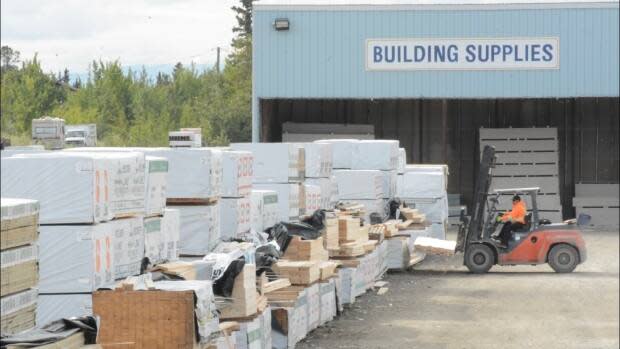Lumber costs down but everything else is up, say Yukon builders

It's shaping up to be a busy construction season in Yukon — and not because building costs are going down. In fact, Yukoners are being told to prepare to pay more for almost everything they need to build or renovate a home.
The only things that seem to have come down in the last year are lumber prices, says Rob Fordham, president of Kilrich Industries, a building-supply retailer in Whitehorse.
"The lumber market kind of hit all-time record highs, astronomical levels, back in June, July of last year. And then it kind of dried up," Fordham said.
As an example, he says a sheet of half-inch plywood was going for as much as $90 or $95 last summer, compared to about $60 now.
That's still up significantly from pre-pandemic prices, Fordham says. And most everything else is up as well.
"A lot of the other components that we provide, such as drywall and insulation and fasteners and siding and roofing, those prices on those types of materials have continued to increase over the last two years," he says.
"There's been no drop there — they're only up."

Fordham says record-high fuel prices, along with a nation-wide trucker shortage, mean it's neither cheap nor easy to get supplies shipped North.
"I mean, pretty much every carrier is charging a 30 per cent fuel surcharge at this point," he said.
'Hey, you've got to double that'
For builder John Vogt of Whitehorse's Vogt Homes, it means profit margins get a little tighter and he needs to find ways to be more efficient with materials. But Whitehorse's white-hot housing market means he's still turning a profit.
"We're fortunate — other people aren't — that the price of houses was high before lumber went up, and they've continued to rise," he said.
Vogt says he builds about four new homes per year. He says he won't give customers a set price quote for materials.
"I can't. The prices fluctuate too much. And then yeah, you're in real trouble — especially if you quote a year out ... last year... you'd come back even a month or two later and say, 'Hey, you've got to double that.'"
He doesn't expect things to change anytime soon. And he certainly doesn't expect things will ever get any cheaper, citing inflation.
"If someone's coming and talking to me about it, I would suggest that, you know, don't put yourself in a situation where you can't pay for it if prices go way up," Vogt said.
"But holding off and waiting two or three years to buy is not necessarily going to get you anything cheaper."


